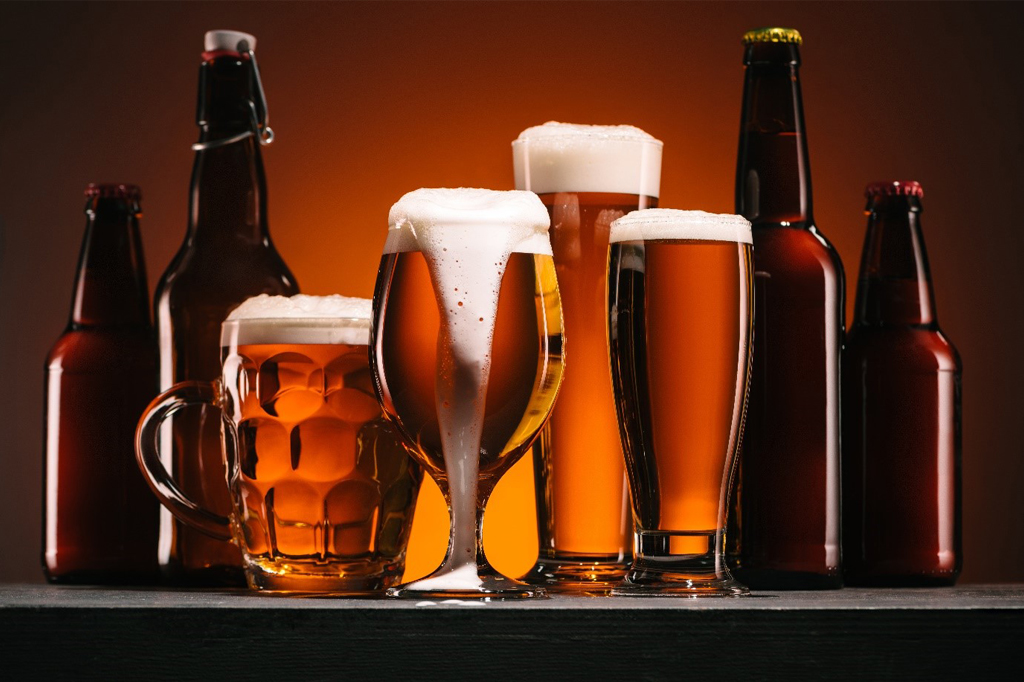
Introduction
Alcoholic beverages are divided into three groups: malt liquor, fermented wines and distilled liquors. Beer requires malted (germinated) grain to make the carbohydrates fermentable. Beer is a beverage of low alcoholic content between 2 and 7% made by brewing various kinds of cereal with hopes. These cereals are usually added to impart a more or less bitter taste and to control the fermentation. For manufacturing beer, there are multiple processes such as collecting barley or raw materials, Malting, Steeping, Germination, Kilning, Milling, Mashing, Brewing, Cooling, Fermentation, Maturation, Filtration, Flash Pasteurization and Tunnel Pasteurization, Bottle Filling and Packaging.
Process of Beer Manufacturing Process:
Process of manufacturing beer, there are multiple processes such as collecting barley or raw materials, Malting, Steeping, Germination, Kilning, Milling, Mashing, Brewing, Cooling, Fermentation, Maturation, Filtration, Flash Pasteurization and Tunnel Pasteurization, Bottle Filling and Packaging.
The first step in making beer is to collect barley or raw materials. After collecting barley, the Malting Process begins. The malting process is a crucial step in the production of beer. It is the process of converting the starches in grains, most commonly barley, into fermentable sugars, which will then be used for the fermentation of beer. The first step in the malting process is the selection of the grains. Barley is the most commonly used grain, though other grains such as wheat, rye, and oats can also be used. The grains are then soaked in water to activate the enzymes, which will begin the process of converting starches into fermentable sugars. The soaked grains are then spread out on a malting floor, and then turned and aerated regularly to ensure that the enzymes are working properly. Once the conversion of starches into sugars is complete, the grains are then kilned, or dried, to halt the enzymatic process. This kilning process creates the desired flavour and colour for the beer. After the kilning process, the malt is milled to prepare it for brewing. Additionally, we will briefly describe the malting process to clarify your understanding.
Steeping is the process of soaking crushed speciality grains in hot water to extract colour and some flavour compounds from the grain.
Germination, water and oxygen are activated, which in turn initiates all enzymes. As a result of these enzymes, corn starch molecules are converted into sugars that the embryo can use as food. Corn and barley roots are embryos. During modification, other enzymes attack starch grains’ walls, converting them into insoluble proteins and complex sugars (glucans) into soluble amino acids and glucose.
Kilning process, the green malt is dried up to remove moisture. The green malt is a grain that has been germinated and steeped before being dried. Curing this in a warm environment promotes the reaction between sugar and amino acid which produces the colour and flavour.
Dry in a high-flow system to remove moisture. In order to remove rootless green malt, it will be cooled.
Milling is the process of grinding, cutting, pressing, or crushing a material in a special machine. Malt needs to be milled properly in order to extract water efficiently. In this process, malt size is corrected and husks are retained from roller mills. It also transforms starch into particles.
Mixed mashing process, high wort is concentrated, fermented, and diluted to produce more beer. In this process, milled malt is referred to as grist, which is combined with water, starch, molecules, and enzymes in a rapid reaction. Malt must be well modified. The breakdown of proteins and glucans has already occurred at the malting stage. When starch is heated to thicken it, amylase becomes very active. Low-modified malt can lower the temperature and break down the proteins and glucans. The grist is mashed properly, then removed, boiled, and then added back after it has been mashed. In the mixed mash process, we can add wheat and corn. For that, we must boil it and thicken it both in the raw material and in the water.
Water is added to the malt and created in the mash mixer, where the wort is extracted. 85% of the waste will be separated in a clarifying tank or lauter tun. This process is called spent grain.
Mashing process, wort means the sweet liquid extracted during the mashing process. And the husk that has been trapped is solid and needs to be drained. Wort contains some amounts of sugar and it contains amino acids, salts, vitamins, carbohydrates, and small amounts of protein. Wort separation takes 4 to 16 hours.
Hops are added to the brewing process. Hops are green cone-shaped flowers or blossoms, that are derived from the Hop plant. The hops are substances that give beer its distinctive taste. They have long been known to inhibit the growth of bacteria during fermentation. During the transfer of wort to the kettle, enzymes and bitterness from value are removed and then hops are added to it.
During the whirlpool separator process, the beer is fermented at a cooling temperature and stored for several weeks. As a result of this cooling fermentation, several flavour components are consumed and a flavour is cleaned which is unwanted for the beer process.
Fermentation Process, basically in the fermentation process, there are two types of fermentation one is top fermenting which is processed in warm temperature fermentation. Other is bottom fermentation which is processed in cooling fermentation. Top fermentation takes a few times than bottom fermentation. In this process of fermentation, the green alcohol made by the sugar which is present in wort is converted into alcohol and carbon dioxide. Green alcohol means a green colour which is naturally extracted from herbs. Warm filtration is also can consume and some other drinks have to be matured by barrel ageing.
Maturation Process, this process is used in beer and liquor both. In this process ageing the beer for some time to bring out the effects of variation in the final product. The type of lambic beer is fully fermented in wood.
Challenges face in Beer Manufacturing Process
In process of Beer, the unwanted flavour is developed, and for removing those, the Filter process is important. The polishing, removing microorganisms, haze and other hops particles have to be removed before the bottle filling process.
How Filtration can help?
Filtration filters are used to remove flavours from the beer. The further development of yeast releases negative components and flavours. As a result, the beer becomes haze-free. A filter helps to make a beer clear and polished. We can use either a sheet filter or a candle filter for this. Diatomaceous Earth is added to a filtration bed which allows the liquid to flow more efficiently and holds suspended particles like yeast.
The filter also removes hops and grain particles that are left in the beer and also eliminates cloudiness and microorganisms in a better way. In order to polish the beer and remove microorganisms, filters like filter bags and polypropylene pleated cartridges can be used.
Filter Concept provides a polypropylene pleated filter cartridge that is designed for use in critical filtration applications for beverages such as wine, alcohol, fruit juices, and beer. This filter cartridge makes use of the latest gradient-density microfibre media technology. This provides a combination of excellent micron rating, high flow rates, and high contaminant holding capacities. This helps to effectively remove microorganisms from the beverage. For a video, illustration do follow our video series at https://filter- concept.com/video-series/
For more enquiries do reach out to us at [email protected] or [email protected] We will be looking forward to your valuable feedback!
About Author
Filter Concept Private Limited is the leading industrial filters & cartridges manufacturer, exporter, and supplier! We are delighted to be your go-to source for filtration solutions for all your demanding applications of air, gas and liquid filtration.
Based in Ahmedabad, the commercial hub of India, we offer an extensive range of products that includes Industrial Dust Collection system, cartridge filter housing, bag filter housing, basket filter housing, self-cleaning filters, filter cartridges, filter bags, and more. Our team of experts has decades of experience working with the best-in-class filtration technologies that ensure unparalleled performance and reliability.
We are committed to delivering the highest quality products and services to our customers. Our dedication to meeting customer expectations is what sets us apart from the competition and has earned us a reputation as the go-to source for industrial filtration.
At Filter Concept Private Limited, we understand that your filtration needs are unique. That’s why we offer customized solutions and use our knowledge and expertise to tailor every solution to your specific needs.
We invite you to explore our complete range of filtration solutions and let us be your trusted partner for all your filtration needs.


